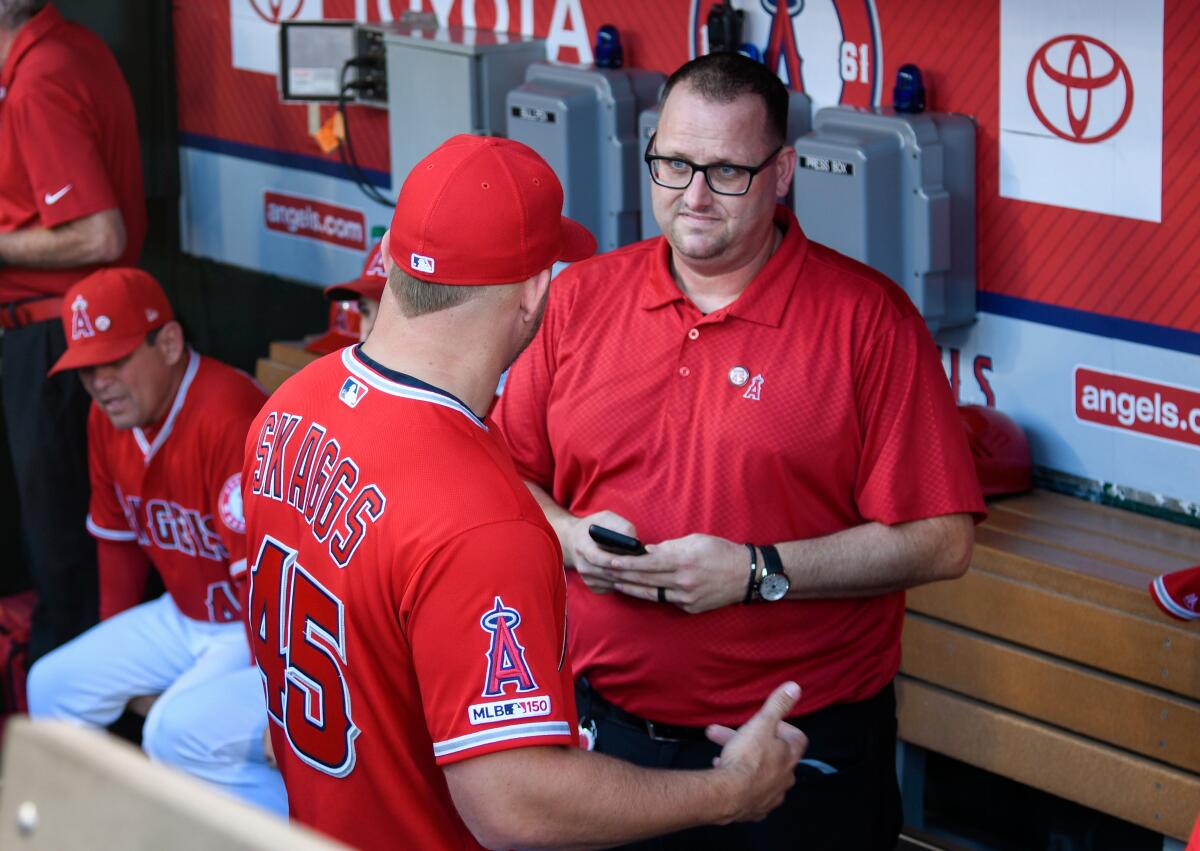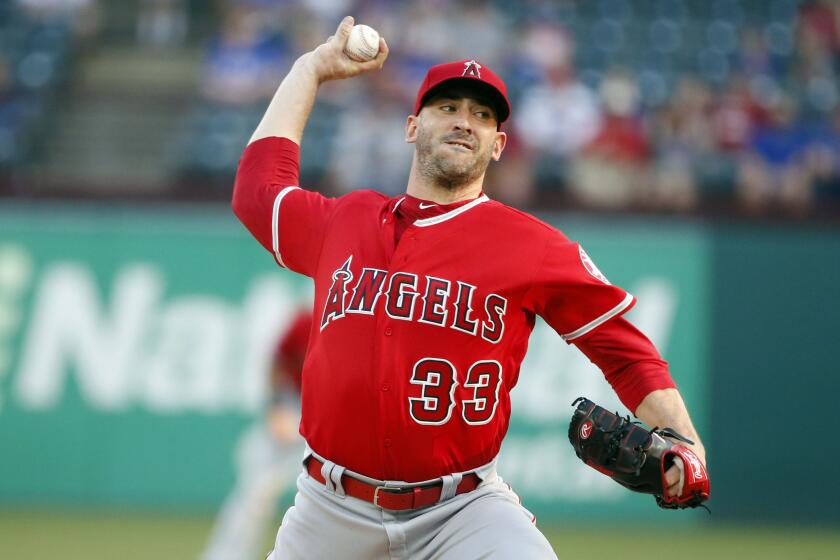Four former Angels say they received oxycodone pills from Eric Kay

FORT WORTH — Four former Angels players testified Tuesday to receiving oxycodone pills from Eric Kay, the team’s former communications director charged with giving Tyler Skaggs the drugs that resulted in his death in a suburban Dallas hotel room in July 2019.
Three of the players — C.J. Cron, Michael Morin, and Cam Bedrosian — said Kay was their only source for oxycodone pills. The fourth, Matt Harvey, testified that he received oxycodone pills twice in 2019 from a friend in Rhode Island, including once in April when Skaggs asked him for pills.
The prosecution, attempting to convince the jury that Kay was Skaggs’ only source for oxycodone, pointed out that Kay was in rehab for drug addiction in April 2019.
Harvey, appearing slimmer Tuesday than during his brief time in 2019 as an Angel, was given immunity to testify after being subpoenaed by the government. He detailed his personal drug history and shared what he knew about Skaggs’ drug use. He hinted that oxycodone misuse is prevalent across the major leagues.
“Was it uncommon for players to use oxycodone at the time?” U.S. Asst. Atty. Errin Martin asked.
“No,” Harvey said.
Hours later, the government called Carli Skaggs, the pitcher’s widow, for an emotional testimony. She took a deep breath upon taking her seat. She introduced herself as Tyler Skaggs’ wife — and, after a brief pause, his widow. She apologized for talking over U.S. Asst. Atty. Lindsey Beran.
“Sorry,” she said. “This is really hard for me.”
Beran asked Skaggs about her marriage. About how often and when they communicated. About the last time she saw him. Skaggs said it was in the family room at Angel Stadium and, after gathering herself, explained where that was. She said she didn’t know her husband to hang out with Kay outside of work. She was asked if she remembered the morning he died.
“Yes,” Skaggs said before pausing. “I’m sorry. I try to block out that out.”
Matt Harvey’s suspected drug use has been discussed throughout the trial, and the defense has accused Harvey of providing drugs to Tyler Skaggs.
She said she couldn’t get hold of him so she called the hotel and reached out to a teammate and an Angels employee. Later, Angels general manager Billy Eppler called her to share the news.
During cross-examination, defense attorney Michael Molfetta asked Skaggs if she was aware her husband used drugs “fairly regularly” prior to his death. She said no. She said she would’ve intervened had she known.
Tyler Skaggs’ former teammates testified they knew.
Cron, who played for the Angels from 2014-18, said that he bought drugs from Kay on eight occasions, including once in 2018 when he played for the Tampa Bay Rays. Cron said he gave Kay the money at Angel Stadium — in the family room or a hallway — and Skaggs dropped the pills off at the Rays’ team hotel.
Morin said he bought oxycodone pills from Kay in 2016 and 2017 “probably five or six times” while he dealt with thoracic outlet syndrome. He said Skaggs offered Kay as someone who could get him medication to deal with the pain. He said he would leave money for Kay in a cubby in the upper left part of his locker and Kay would leave the pills there.
The prosecution showed a copy of a group text including Kay, Skaggs and Morin on July 18, 2017, in which Kay asked them if they wanted “rockets” for $30 each. He recommended them getting a “good amount” to last. In another text in 2017, Skaggs asked Morin if he could pay him for pills because Morin had “cleaned out” Kay. Morin testified he told Skaggs he could take as many as he wanted.
Morin said he never took drugs with Skaggs and stopped taking pills when he left the Angels after the 2017 season.
Bedrosian testified buying “three or four” pills from Kay. He said he took one and “didn’t feel right” so he returned the rest of the pills to Kay. He said he bought pills from Kay “maybe one other time.”
The four players’ revelations arose after the government Monday introduced former Angels pitcher Garrett Richards as someone who potentially bought drugs from Kay based on three money transfers totaling $1,700 he made to Kay on Venmo between Nov. 2016 and Nov. 2017.
Major League Baseball and its players’ union agreed to add opioid testing to the league’s drug policy five months after Skaggs’ death. The testing began during the 2020 season.
Harvey testified being introduced to oxycodone by Skaggs during spring training in 2019. Harvey recalled going to Skaggs’ residence after playing basketball at the Phoenix Suns’ arena and having a beer when Skaggs showed him a bag of five or six pills. He said Skaggs told them they were oxycodone and Adderall.
Harvey said he didn’t take any pills that day, but Skaggs “talked about taking one.”
Harvey, 32, admitted to regularly using Percocet and cocaine during his major league career, including when with the Angels, and revealed he received Percocet from a hockey player. He said he tried oxycodone for the first time in 2019. He said he orally ingested a piece of an oxycodone pill with Skaggs once at Angel Stadium during the season. He testified that he didn’t like the effect.
“It felt overwhelming to me,” Harvey said. “I didn’t have a good feeling … I felt shaky and sweaty.”
Harvey said he took oxycodone after the experience, but “not frequently.” He said Skaggs told him he would occasionally crush oxycodone pills and snort them in the Angels’ clubhouse bathroom.
Harvey said he shared “three, maybe four” pink pills — he said he doesn’t remember if they were Percocet or oxycodone — with Skaggs in June 2019.
The prosecution then displayed a photo for the jury showing a Google search for “K56 pink pill” Skaggs made on his phone on June 7, 2019. K56 pink pills contain 10 milligrams of oxycodone hydrochloride. Harvey confirmed that was around the time he gave Skaggs pills — shortly before the Angels went on a trip. Harvey was on the injured list and didn’t travel with the team.
Harvey testified that Skaggs texted him asking for two pills to get “loosey goosey” after the trip. Harvey said he gave him six or seven Percocet pills — all that he had left from the batch he received from his friend in Rhode Island — in the Angels’ clubhouse on June 22. Harvey said he didn’t know if Skaggs obtained drugs from anyone besides Kay.
“Obviously, looking back, I wish I had [warned him],” Harvey later testified during cross-examination with the defense. “In baseball, you do everything you can to stay on the field. … At the time I felt like I was being a good teammate helping him get through whatever he was going through. … Unfortunately, I gave him more.”
Harvey testified he believed he thought he was joining the Angels on their upcoming trip — the team was scheduled to leave on the night of June 30 to Texas — but found out the day before that he wasn’t going. He said he was “upset” and “felt left out” so he went to a bathtub to calm down. On the way there, he said he ran into Kay, who had recently returned from rehab. He said Kay mentioned having blue oxycodone pills and they talked about Harvey receiving one. Harvey said Kay left one at his locker.
Harvey said he decided not to take the pill that night because his anger had subsided and he had to drive home to Newport Beach. That night, the Angels flew to Texas ahead of a series against the Texas Rangers scheduled to begin the next day. Skaggs was found dead just after 2 p.m. CDT the next day.
Percocet, a combination of acetaminophen and oxycodone, was discovered in Skaggs’ hotel room, but it wasn’t discovered in his system, according to the autopsy report. The Tarrant County Medical Examiner’s office determined he choked on his vomit with a mix of fentanyl, oxycodone, and alcohol in his system.
Harvey said he threw away the pill he received from Kay when he arrived at Angel Stadium on July 1 because he didn’t want to have anything to do with that happened and “I was very scared.” He said he went to Texas the next day to be with the team. He testified that Kay “seemed very on edge … nervous” and recalled a brief conversation with him.
“He said something about ‘staying together during this time,’ ” Harvey said.
Asked why he believed Kay told him that, Harvey said because he thinks Kay had heard he gave Skaggs pills. He said he assumed Kay also gave him pills. During cross-examination, however, Harvey testified he didn’t know for sure if Skaggs had received the pills that led to his death from Kay. He also said he didn’t know the extent of Skaggs’ drug use.
Prosecutors again proposed that another Angels employee, Hector Vazquez, connected Eric Kay with the person who supplied the drugs that led to Tyler Skaggs’ 2019 death.
The Angels released Harvey on July 21, less than three weeks after Skaggs died, despite him being on a one-year contract worth $11 million guaranteed. Poor performance — Harvey posted an 7.09 ERA in 12 starts — was the reason publicly given by the team.
The government rested its case Tuesday after ending the afternoon with two witnesses called to deflate two defense arguments.
Dr. Stacey Hail, a medical toxicologist asked by the government to review evidence in the case, testified she concluded Skaggs wouldn’t have died if he didn’t have fentanyl in his system. Her account supported the government’s contention that Skaggs wouldn’t have died “but for” the fentanyl, which would have come from counterfeit blue 30-milligram oxycodone pills.
The defense has asserted it cannot be proven with 100% certainty that fentanyl was the cause of Skaggs’ death.
The government’s final witness was Susannah Herkert, a pilot and former Drug Enforcement Administration agent.
The defense has argued Skaggs could’ve received drugs from someone besides Kay hours before he died while the team waited to board its charter flight to Texas at the Long Beach Airport. Herkert, who testified she previously worked out of the DEA’s office at the Long Beach Airport, asserted access to the tarmac for chartered planes was restricted.
More to Read
Go beyond the scoreboard
Get the latest on L.A.'s teams in the daily Sports Report newsletter.
You may occasionally receive promotional content from the Los Angeles Times.









